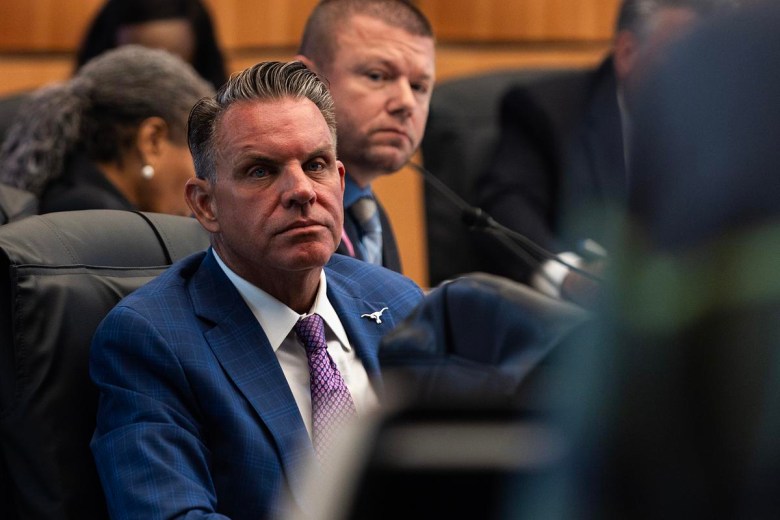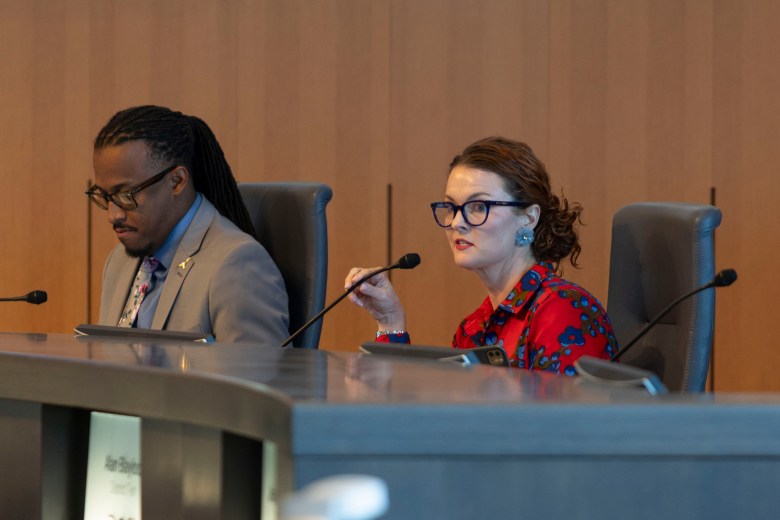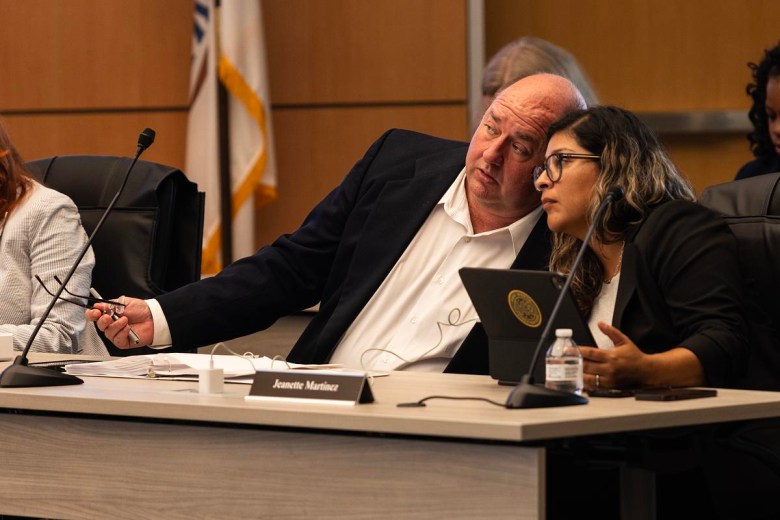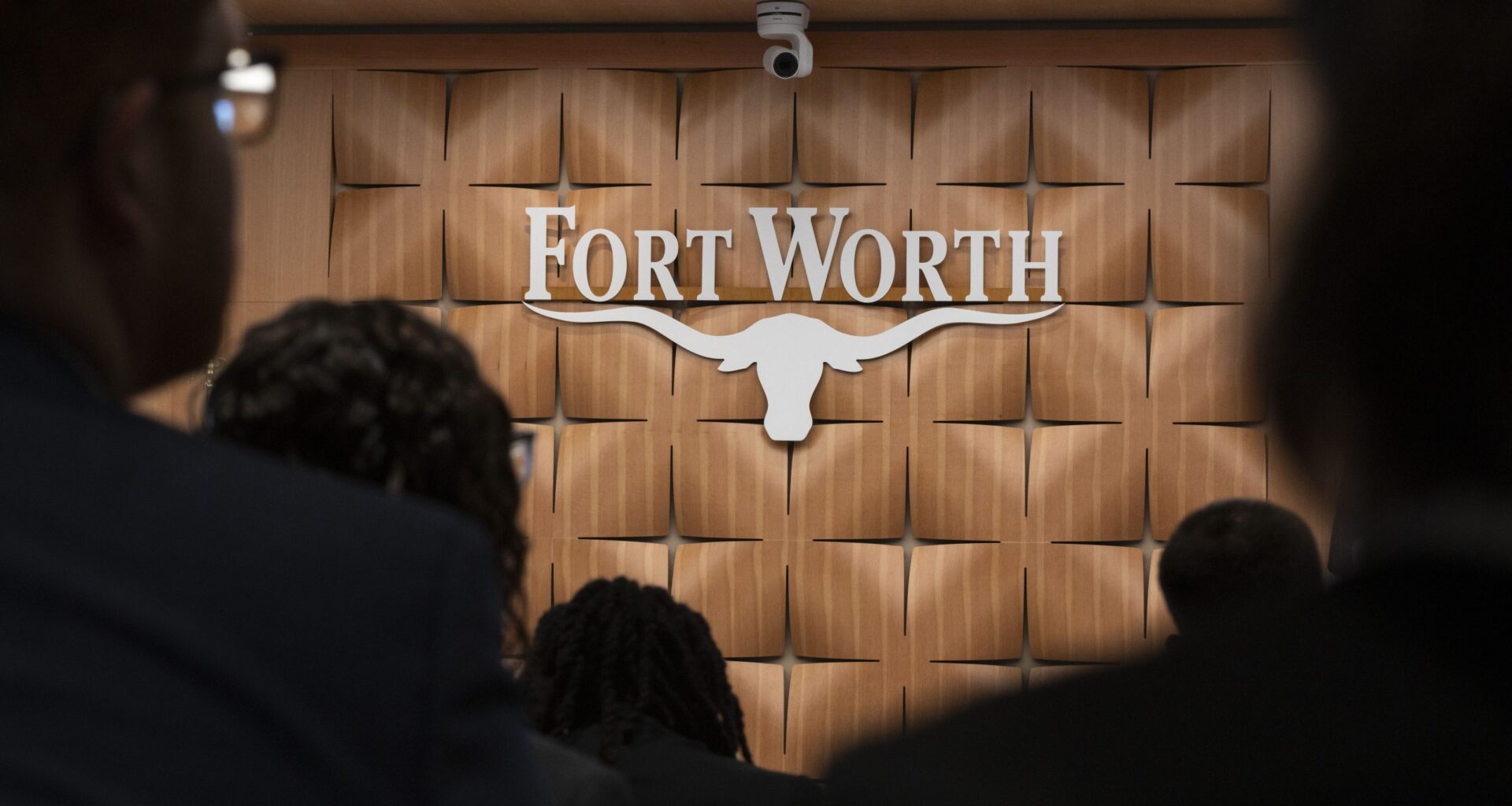Fort Worth officials can’t release public information detailing how much City Council members spent on city-funded travel because of reporting discrepancies, officials in the city manager’s office told the Fort Worth Report.
Flaws within the city’s internal system for tracking and verifying city-funded travel led to discrepancies that require reconciliation, city officials said. Finance department staff are working with council members’ offices to reconcile travel records dating back to 2021, which includes line-by-line review of expenses.
“It shouldn’t be complicated — we owe media and taxpayers easy access to their records,” Mayor Mattie Parker said in a statement. “I’m confident in our judiciousness with funds and look forward to a completed audit of internal processes related to council members’ travel expenses.”
Sana Syed, chief spokesperson for the city, said staff discovered inaccurate expense reports when reviewing travel expenses at council members’ request. During that process, staff found some expenses were incorrectly coded and/or charged to the wrong accounts, which resulted in discrepancies between expense reports produced by council district offices and the city’s finance department.
“While the travel policy was followed and budgets were not exceeded, expenses were not always coded accurately, creating gaps in the reporting,” Syed said in a Sept. 10 statement.
The review came after the Fort Worth Report obtained and reviewed expense reports detailing City Council members’ travel during fiscal years 2022 and 2023, which spanned October 2021 to September 2023. The Report submitted a public information request Aug. 25 to access similar reports for 2024 and 2025.
However, city records custodians are unable to fulfill the Report’s request until all travel expenses are reconciled, Syed said. All expenses should be reconciled by the end of September, she said.
After Fort Worth officials informed the Report that the public information request would take several weeks to fulfill, the city attorney’s office requested a ruling from the attorney general’s office on whether “some or all of the requested information may be excepted from disclosure,” citing a Texas law that exempts personal financial information from public release.
The Texas Public Information Act gives the public the right to access and inspect government records by requesting information from a government entity. Under the act, government entities must release the requested information within 10 business days but may request to withhold information deemed exempt under the law.
Documents show $145K of council travel over two years
The Fort Worth Report contacted each City Council member for clarity and insight on the available travel expenses.
The 2022 and 2023 expenses reviewed by the Report — which Syed emphasized could paint an incomplete picture due to inaccurate tracking — show that council members spent at least $145,000 on city-related travel.
Over the two-year time frame, council members took more than 70 trips and visited at least six Texas cities, nine states and seven countries. The trips include municipal government conferences, legislative days at the Texas Capitol and multiple excursions through Fort Worth’s diplomatic sister cities program.
City Council member Michael Crain accounted for most of the spending, about 40%, expensing about $57,000 on travel during that period.
That included trips to Paris, Munich and Barcelona, according to the documents reviewed by the Report. Crain’s most expensive trip — nearly $16,000 — was a nine-day trip to Colorado to attend the Aspen Institute’s executive leadership seminar.
After initially declining to comment until the expenses are reconciled, Crain said in a statement that he has always followed official guidelines for travel requests. Those are outlined by the city manager’s office and authorized by the chief of staff.
“In regard to the inconsistencies within the city process for tracking and reporting, I share the concerns of my colleagues and support the reconciliation process,” said Crain, who represents west Fort Worth.
 Fort Worth City Council member Michael Crain listens during a council work session meeting Aug. 5, 2025, at City Hall. (Maria Crane | Fort Worth Report/CatchLight Local/Report for America)
Fort Worth City Council member Michael Crain listens during a council work session meeting Aug. 5, 2025, at City Hall. (Maria Crane | Fort Worth Report/CatchLight Local/Report for America)
Crain said he has shared “best practices and insights garnered” from his trips with his colleagues, city staff and in opinion commentaries he wrote for Fort Worth Inc., as well as with reporters at the Fort Worth Report.
Former council member Jared Williams spent the second highest amount, a little over $22,000.
Williams, who vacated his seat on council this year after representing southwest Fort Worth and Como for four years, said he was surprised to learn that council travel expenses haven’t been tracked accurately.
Williams said he and his district staff were “very intentional about the way we managed the expense process and always had documentation and justification.” He maintains that the process for documenting travel expenses was “very clear” and overseen by city management.
“It’s really important that, as we’re managing taxpayer dollars, that we have processes in place that promote public trust, and to ensure that we are being as efficient as possible and being good stewards of the taxpayers’ dollars,” Williams said.
Council member Alan Blaylock, who spent about $6,000 over two years of travel, declined to comment until city management provides updated travel expense information. Council members Charlie Lauersdorf, Macy Hill, Deborah Peoples and Mia Hall did not return requests for comment.
Parker reported about $5,400 in travel expenses over the two-year period. Her most expensive trip, about $2,700, was to Washington, D.C., for the U.S. Conference of Mayors. Some expense reports did not include any dollar amounts for Parker’s travel. Her 2022 trip to Qatar for Bloomberg’s Qatar Economic Forum was paid for by undisclosed third parties, according to the documents.
City travel is necessary aspect of role, council members say
Williams and other council members stressed that city-funded travel is a necessary and valuable aspect of serving Fort Worth.
By traveling to other cities and countries, they gain knowledge and information they otherwise wouldn’t have access to, which they in turn can bring home to implement or experiment with in Fort Worth, council members said.
Williams noted Fort Worth’s sister cities program as one way council members enhance the city through their travel. “Sister cities” are municipalities that enter into citizen-driven, diplomatic, cross-country relationships to share cultures, host each other and build a global relationship, according to the program’s website.
He said his role as the liaison to the Indonesian city of Bandung resulted in a number of partnerships and initiatives, such as vital discussions on anti-bullying, cultural events at City Hall to celebrate Indonesian residents, collaboration with Indonesian leather manufacturers and artists, and learning about implementing high-speed rail.
Kippen de Alba Chu, president and CEO of Fort Worth Sister Cities, said the global relationships often lead to economic benefits, and travel is a necessary part of building those relationships.
“We’re here to enhance the quality of life of being in Fort Worth, and I think that’s the biggest part,” de Alba Chu said.
One example is Nagaoka, Japan, de Alba Chu said. To celebrate the two cities’ 25th anniversary as sister cities, Nagaoka donated 100,000 fireworks, which resulted in Fort Worth hosting one of the largest Fourth of July fireworks displays in the country. Nagaoka also gifted a Shinto shrine and multiple trees to the Fort Worth Botanic Garden’s Japanese Garden.
Council members Elizabeth Beck and Chris Nettles recorded about $10,900 and $17,200 in travel expenses, respectively, during fiscal years 2022 and 2023. In separate interviews, each said the process for deciding when, where and how to travel boils down to one main question: Will it benefit Fort Worth?
“My barometer is: I have to be able to look my constituents in the eye and justify to them that it was a benefit to them, that I gained some sort of benefit in serving them (through) that travel,” Beck said.
Her travels primarily included trips to municipal government conferences that her colleagues also attended. In 2022, she expensed a little more than $2,000 to travel to the White House with then-Tarrant County Judge Glen Whitley for President Joe Biden’s signing of the PACT act, a law expanding federal health care services for veterans.
Nettles’ most expensive travel during the two-year time frame was a roughly $3,300 trip to Barcelona, Spain, when council members were exploring options on how to bring FC soccer to Fort Worth. Although the trip ultimately didn’t result in a viable option, Nettles said it was invaluable to gain knowledge that could inform ongoing discussions on the topic. The World Cup kicks off in Arlington next year.
“That’s what our job is as a city, is to grow the city economically, grow the population, and you do that by bringing things to the city where people can live, work, enjoy, play and X, Y and Z,” Nettles said. “So it was certainly a trip that needed to be had.”
 Fort Worth City Council member Elizabeth Beck speaks as council member Chris Nettles listens during a council meeting May 20, 2025, at City Hall. (Mary Abby Goss | Fort Worth Report)
Fort Worth City Council member Elizabeth Beck speaks as council member Chris Nettles listens during a council meeting May 20, 2025, at City Hall. (Mary Abby Goss | Fort Worth Report)
Council members vow to resolve discrepancies, ensure transparency
Under the city’s travel policy, council members may travel at their discretion. Council members and their district staff may initiate expense payment or reimbursement, but the finance department oversees that process.
Syed said the city routinely audits expenses, but there has not been an audit specifically focused on council members’ travel expenses. To “strengthen the administrative process going forward,” city management is centralizing travel-expense reporting, she added.
Council member Carlos Flores said it’s been his practice to check with the city’s legal department before finalizing travel plans. When it comes to tracking expenses or getting reimbursed, he makes sure to electronically document all receipts and invoices. He reported about $15,300 in travel expenses.
“I save my receipts. It’s really not that difficult beyond that,” Flores said.
 Fort Worth City Council members Jeanette Martinez, right, and Alan Blaylock speak during a council work session meeting Aug. 5, 2025. (Maria Crane | Fort Worth Report/CatchLight Local/Report for America)
Fort Worth City Council members Jeanette Martinez, right, and Alan Blaylock speak during a council work session meeting Aug. 5, 2025. (Maria Crane | Fort Worth Report/CatchLight Local/Report for America)
Council member Jeanette Martinez took office in June 2023, about three months before the end of that fiscal year. She said multiple factors — including insufficient or inconsistent training — could have contributed to the flawed tracking system.
“I could see why people would think that this is, of course, not very professional, and that we would do better at managing city finances,” Martinez said.
She said she has full confidence that city staff will reconcile all issues. Every city dollar spent on council travel has a record, she said, and staff now must ensure that those are accurately tracked.
Flores said council members take the discrepancies seriously, and they’re committed to ensuring fiscal responsibility and transparency.
“The steps that we’re taking is an indication that we look at this very seriously and are going to take measures to ensure that our processes are better and that we can avoid ambiguity,” Flores said. “Council is going to learn more from staff as they look into the matter further.”
Cecilia Lenzen is a government accountability reporter for the Fort Worth Report. Contact her at cecilia.lenzen@fortworthreport.org.
At the Fort Worth Report, news decisions are made independently of our board members and financial supporters. Read more about our editorial independence policy here.
Related
Fort Worth Report is certified by the Journalism Trust Initiative for adhering to standards for ethical journalism.
Republish This Story
Republishing is free for noncommercial entities. Commercial entities are prohibited without a licensing agreement. Contact us for details.
